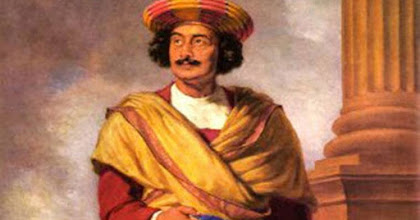Life of Raja Ram Mohan Roy
Raja Ram Mohan Roy is called the father of modern India, he had done many social reforms in India, the questions related to which are also asked in the IAS exam of India, he was born on 22 May 1772. in Hooghly, West Bengal. He was born in Radha Nagar village of the district. His father's name was Ramakant Rai and mother's name was Tarini Devi.
His maternal grandfather Krishna Chandra Burnji used to be the Nawab of Bengal, Rajaram Mohan Roy was rich in talent and multi-lingual personality. He is said to have good knowledge of Bengali, Persian, Arabic, Sanskrit, Hindi, English, Greek, French and Latin languages.
Education of Raja Ram Mohan Roy
It is said about his education that he went to England in the year 1830 and lit the torch of Indian education. He was considered a very good scholar of history. He served as a private Diwan for the East India Company under Woodford and Digby from 1803 to 1814.
Thinking
- Roy is said to have been greatly influenced by Western modern thought.
- He laid more emphasis on rationalism and modern scientific approach.
- Rajaram ji believed that religious orthodoxy harms social life.
- He believed that every sinner should atone for his sins.
- He was a strong opponent of the caste system.
- He was attracted to Islamic monotheism.
- He believed that monotheism created a universal model for humanity.
Contribution of Rajaram Mohan Roy to the Country
Rajaram Mohan Roy is known for religious reforms, social reforms, educational reforms and economic and political reforms, among the most important works was the practice of Sati, let us know what Rajaram did in all these reforms.
Religious Reform
The first of the religious reforms was the publication of Tuhfat-ul-Muwahideen (A Gift to the Gods) by Rajaram in 1803, which exposed the irrational religious beliefs and corrupt practices of the Hindus.
Mohan Roy founded the Atmiya Sabha in the year 1814 in Calcutta, the capital of West Bengal, to oppose idol worship, caste rigidity, meaningless rituals and other social evils.
He criticized the ritualistic practices of Christianity, and rejected Jesus Christ as the incarnation of God. In the year 1820 he also wrote the book Preceptus of Jesus.
Social Reforms
Rajaram envisioned reformist religious associations which saw social and political change. He later founded the Atmiya Sabha in 1815, the Calcutta Unitarian Association in 1821 and the Brahmo Sabha in 1828.
He campaigned against the caste system, untouchability, superstition and drug use in the country.
He laid more emphasis on women's freedom and abolition of Sati system and widow remarriage. It was only after his tireless efforts that the practice of Sati came to an end.
He opposed child marriage, illiteracy of women and degrading condition of widows in the country and demanded rights in inheritance and property for them.
Educational Reform
Raja Ram Mohan Roy spread modern education in the country. He supported David Heyer's efforts to establish the Hindu College in the year 1817. At that time Rajaram ji used to teach mechanics and Voltaire's philosophy in the English school.
In the year 1825, Rajaram Mohan Roy established the Vedanta College where both western social and physical science courses were taught and taught to the people of the country.
Economic and Political Reforms
- civil liberty
- freedom of press
- taxation reform
- administrative reforms
Literary Works of Rajaram Mohan Roy
He translated Tuhfat-ul-Muwahideen in the year (1804), the Vedanta saga (1815), in the year Summary of the Vedanta essence (1816), in the year (1820) The Sermon of Jesus- The Guide to Peace and Happiness, ( 1826), Bengali Grammar in the Year (1829), The Universal Religion and History of Indian Philosophy.
Interesting Information
- Raja Ram Mohan Roy abolished the practice of Sati.
- He was a very good scholar of history.
- He had done many social reforms in the country.
- Even today questions about them are asked in exams like IAS.
- He is also considered the idea of human civilization.
Life of RK Narayan



Comments
Post a Comment